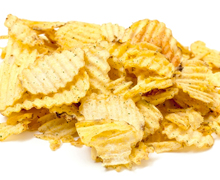
Eating junk food can have an impact on how you feel but a new study shows it can affect you in other ways as well. Researchers at Uppsala University found eating an unhealthy diet affected the quality of the sleep of their study participants.
Healthy people were fed either a healthy diet or unhealthy diet in a randomized order and it was determined that the study participants who ate an unhealthy diet had a diminished quality of deep sleep compared to those who followed a healthier diet.
"Both poor diet and poor sleep increase the risk of several public health conditions," said Dr. Jonathan Cedernaes. "As what we eat is so important for our health, we thought it would be interesting to investigate whether some of the health effects of different diets could involve changes to our sleep."
The study consisted of 15 normal-weight young men and they completed two sessions. They were first screened for their sleep characteristics which had to be within the recommended range. Each reported an average of seven to nine hours per night.
The diets of the participants were assigned in random order and were either considered healthy or unhealthy. They had the same amount of calories and were tailored to the daily requirements of each participant, but the unhealthier diet was higher in sugar and saturated fat and contained more processed food.
Each session lasted a week and during that time the participants’ were closely monitored for adherence to the prescribed diet and meal schedule. The subjects were then examined in a sleep laboratory.
"What we saw was that the participants slept for the same amount of time when they consumed the two diets," Cedernaes said. "This was the case both while they were following the diets, as well as after they had switched to another, identical diet. In addition, across the two diets, the participants spent the same amount of time in the different sleep stages.
"But we were particularly interested in investigating the properties of their deep sleep," Cedernaes added. "Specifically, we looked at slow-wave activity, a measure that can reflect how restorative deep sleep is. Intriguingly, we saw that deep sleep exhibited less slow-wave activity when the participants had eaten junk food, compared with consumption of healthier food. This effect also lasted into a second night, once we had switched the participants to an identical diet. Essentially, the unhealthy diet resulted in shallower deep sleep."
Cedernaes noted that some of the sleep changes seen as a result of the unhealthy diet were similar to what is experienced by people during the aging process or in those who suffer from insomnia.
"It can be hypothesized, from a sleep perspective, that greater importance should potentially be attached to diet in such conditions," Cedernaes said.
